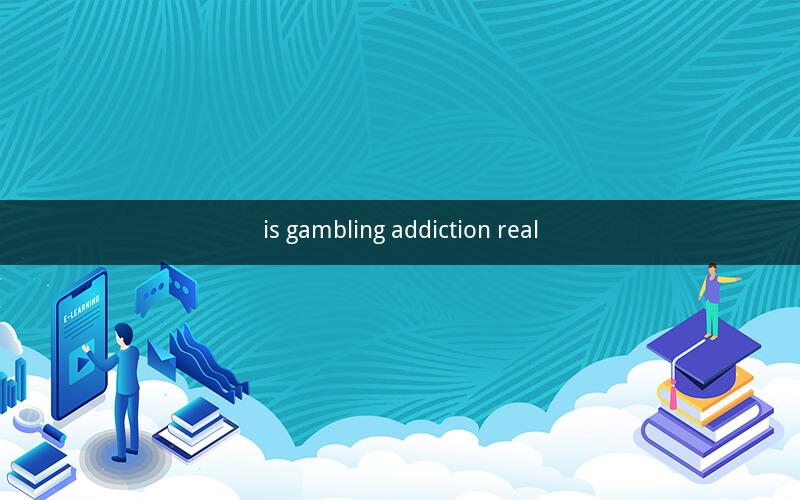
Contents
1. Understanding Gambling Addiction
2. The Psychological Aspect of Gambling Addiction
3. The Social and Economic Impacts of Gambling Addiction
4. Identifying Signs of Gambling Addiction
5. Treatment and Support for Gambling Addiction
6. Prevention and Education
7. Case Studies: Real-Life Experiences
8. The Role of Technology in Gambling Addiction
9. The Legal and Ethical Considerations
10. Conclusion
1. Understanding Gambling Addiction
Gambling addiction, often referred to as problem gambling, is a behavioral disorder characterized by an inability to control the urge to gamble despite negative consequences. It is a real and significant issue affecting individuals, families, and communities worldwide. The term "gambling addiction" encompasses a range of behaviors, from mild to severe, and can manifest in various forms, including online, land-based, and lottery games.
2. The Psychological Aspect of Gambling Addiction
The psychological aspects of gambling addiction are complex. Individuals with gambling addiction often experience a "high" or "rush" when they win, which is associated with the release of dopamine in the brain. This sensation can become addictive, leading to a compulsive need to gamble to achieve the same level of excitement. Psychological factors such as stress, anxiety, depression, and low self-esteem can also contribute to the development of gambling addiction.
3. The Social and Economic Impacts of Gambling Addiction
Gambling addiction has far-reaching social and economic impacts. It can lead to financial ruin, relationship breakdowns, and even homelessness. The social costs include the strain on families, communities, and the healthcare system. Economically, gambling addiction can result in lost productivity, increased healthcare expenses, and reduced tax revenues.
4. Identifying Signs of Gambling Addiction
Identifying gambling addiction can be challenging, as individuals may try to hide their problem. Common signs include:
- Preoccupation with gambling, often to the exclusion of other activities.
- Increasing the amount of time spent gambling or engaging in more risky betting behavior.
- Repeated failed attempts to stop or control gambling.
- Lying to family, friends, or therapists about gambling activities.
- Borrowing money or selling possessions to fund gambling.
5. Treatment and Support for Gambling Addiction
Treatment for gambling addiction often involves a combination of therapy, support groups, and medication. Cognitive-behavioral therapy (CBT) is particularly effective in helping individuals identify and change gambling-related thoughts and behaviors. Support groups like Gamblers Anonymous can provide a sense of community and understanding.
6. Prevention and Education
Prevention and education are crucial in addressing gambling addiction. Schools, communities, and workplaces can implement programs to raise awareness about the risks of gambling addiction. Responsible gambling campaigns can also encourage individuals to gamble responsibly and seek help if they recognize signs of addiction.
7. Case Studies: Real-Life Experiences
Real-life experiences of individuals with gambling addiction highlight the devastating impact it can have. Many have shared their stories, demonstrating the power of recovery and the importance of seeking help.
8. The Role of Technology in Gambling Addiction
The advent of technology has made gambling more accessible than ever before. Online casinos, mobile apps, and social media platforms have expanded the reach of gambling, making it easier for individuals to develop gambling addiction. Addressing the role of technology in gambling addiction is essential in combating this issue.
9. The Legal and Ethical Considerations
The legal and ethical considerations surrounding gambling addiction are complex. Governments must balance the economic benefits of gambling with the need to protect individuals from harm. Ethical concerns include the potential for exploitation and the impact on vulnerable populations.
10. Conclusion
Gambling addiction is a real and serious issue that affects millions of people worldwide. Understanding its psychological, social, and economic impacts is crucial in developing effective prevention, treatment, and support strategies. By raising awareness and implementing comprehensive approaches, we can work towards reducing the prevalence of gambling addiction and helping those affected to recover.
Questions and Answers
1. Q: What is the primary cause of gambling addiction?
A: The primary cause of gambling addiction is a combination of genetic, environmental, and psychological factors.
2. Q: Can gambling addiction be cured?
A: While there is no cure for gambling addiction, it can be effectively managed through treatment and support.
3. Q: How can I tell if someone I know has a gambling problem?
A: Look for signs such as increased time spent gambling, financial problems, and changes in behavior or mood.
4. Q: Are there any medications that can help treat gambling addiction?
A: Some medications, such as naltrexone, have been shown to help reduce the urge to gamble.
5. Q: Can a person with a gambling addiction recover?
A: Yes, many individuals with gambling addiction have successfully recovered with the right treatment and support.
6. Q: How can I help someone who is struggling with gambling addiction?
A: Offer support, encourage them to seek professional help, and be patient throughout their recovery journey.
7. Q: Is online gambling more addictive than traditional gambling?
A: Online gambling can be more addictive due to its convenience and accessibility.
8. Q: Can children develop gambling addiction?
A: Yes, children can develop gambling addiction, although it is less common than in adults.
9. Q: What is the most effective treatment for gambling addiction?
A: The most effective treatment for gambling addiction is often a combination of therapy, support groups, and medication.
10. Q: How can I prevent gambling addiction?
A: Practice responsible gambling, set limits, and be aware of the signs of addiction.